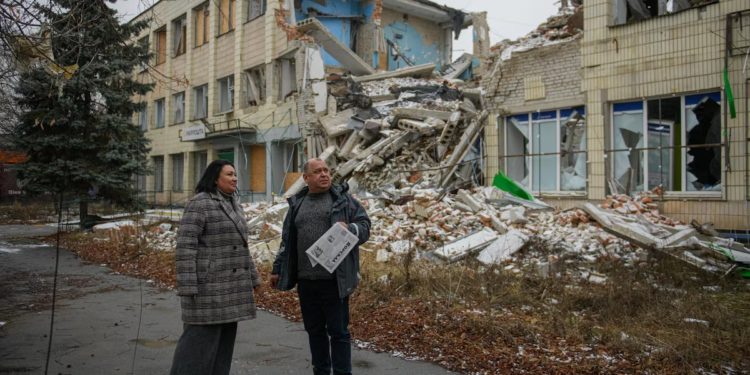The Canadian publication published an article by journalist Mark MacKinnon about a local newspaper in Sumy Region.
Leaving a stack of newspapers at a house with a blue gate and boarded-up windows, Oleksii Pasiuha turned his battered sedan onto the street. He sped away from the nearby russian border, accelerating past burned-out Ukrainian military equipment.
The gray morning cleared as midday approached, making it easier for drones to follow. Oleksii and his wife, Nataliya, had only covered half of what may be the world’s most dangerous newspaper delivery route, delivering copies of the weekly Vorskla to subscribers in an active war zone.
The Pasiuha newspaper route is a lifeline for the few hundred people who remain in Velyka Pysarivka and the surrounding villages. Russian artillery and airstrikes have methodically destroyed all the cell towers in the area. Most residents have had no access to the internet for months. While they can still watch Ukraine’s main TV channels, they provide little information about what is happening in this remote corner of the country.
The Globe and Mail: “In a Ukrainian town devastated by russian war, the newspaper becomes a lifeline”
Only Vorskla, a 95-year-old city newspaper, reports local news—about the activities of those who fled, about the lives and deaths of those from Velyka Pysarivka who are fighting on the front lines… The lead article in the January 24 issue was a story about a local man—a prewar party organizer—who fought in the front-line town of Pokrovsk but returned home for two weeks to try to persuade others to join the army.
Vorskla is as battered as the town it covers. The newspaper’s main office had windows smashed and doors torn off its hinges in March of last year—a guided bomb had hit the nearby post office. This forced Oleksii, the 56-year-old editor-in-chief of Vorskla, to move the newspaper’s newsroom to the city of Okhtyrka, a 90-minute drive away, and its printing house to Vinnytsia in western Ukraine.
The national postal service, Ukrposhta, insists that delivering newspapers to hot spots like Velyka Pysarivka is dangerous. So, Oleksii and Nataliya (a 53-year-old insurance worker who also writes and designs for Vorskla) typeset the newspaper every Tuesday, managing to print enough copies to have 600 copies sent back to them from Vinnytsia by Thursday.
Every Friday, the couple gets into their Daewoo sedan. It begins the hectic drive from Okhtyrka to Velyka Pysarivka with newspapers stacked in the back. Some they deliver in person. Others they leave in bundles with friends, who volunteer to pass them on to neighboring subscribers. The rest are left in piles in the half-dozen small shops that still operate in and around Velyka Pysarivka, where they are resold for 35-50 cents apiece. The Pasiuhas see their delivery route as a contribution to the war effort. Most of the radio stations available in Velyka Pysarivka are broadcast from abroad, from russia, often mixing entertainment programs with not-so-subtle Kremlin propaganda.

 THE NATIONAL UNION OF
JOURNALISTS OF UKRAINE
THE NATIONAL UNION OF
JOURNALISTS OF UKRAINE
















Discussion about this post